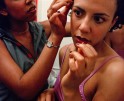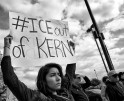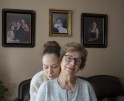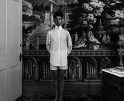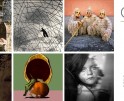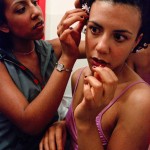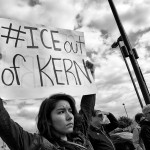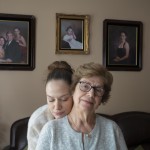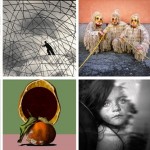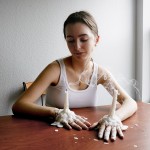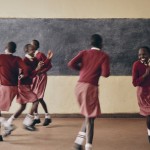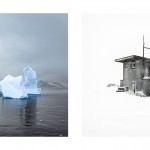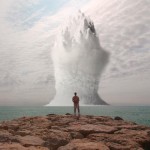CENTER’s Project Launch Winner: Johnny Miller
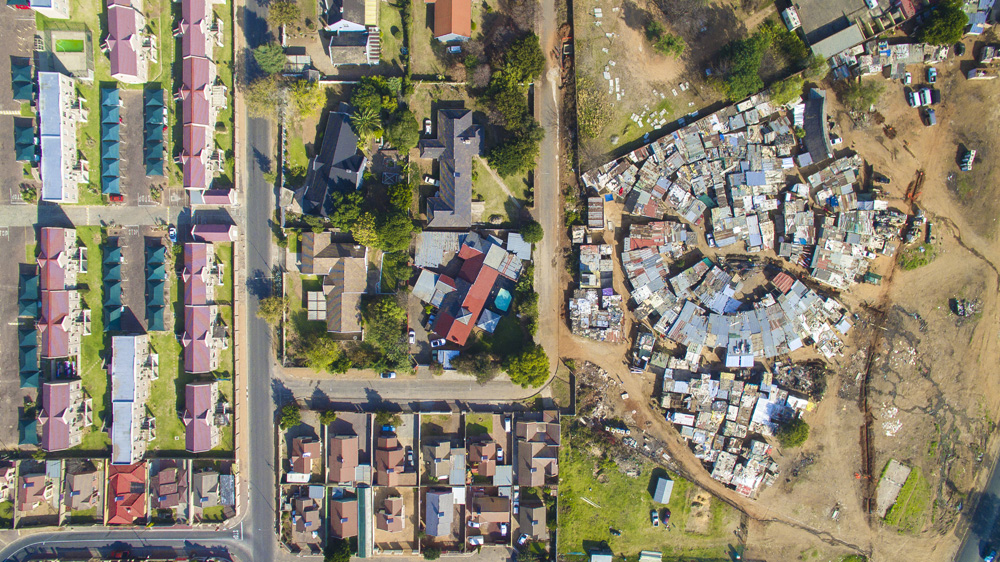
©Johnny Miller, Alex Casey Park, The organic, round shape of the shacks stands in a defensive position next to the wealthier suburb next to it. Shot above Alexandra, Johannesburg, South Africa.
Johnny Miller received CENTER’s Project Launch Award from three significant jurors. His project, Unequal Scenes, looks at the separation of communities from the air for a profound look at the haves and have-nots. Christy Havranek, Photo Director for The Huffington Post Dewi Lewis, Publisher Dewi Lewis Publishing, and Mazie Harris, Assistant Curator, Department of Photographs, J. Paul Getty Museum, CA have selected Johnny’s project and all three of their juror statements follow.
The Project Launch is granted to an outstanding photographer working on a fine art series or documentary project. The grant includes a cash award to help complete or disseminate the works, as well as providing a platform for exposure and professional development opportunities.This grant is awarded to complete or nearly completed projects that would benefit from the grant award package. It requires signature of a contract to participate in an exhibition during Review Santa Fe.
Christy Havranek, Photo Director, The Huffington Post
Christy Havranek is the Photo Director at the Huffington Post. With 17 years experience in photo and digital media, she has previously worked in a variety of industries, all centered on photography: Frommer’s Travel, NBC Universal, Polo Ralph Lauren and Bloomsbury Publishing, among others.
We are constantly surrounded by images. We check Instagram the minute we wake up, expect high-quality photos to accompany the news we read, and are inundated daily with advertising.
So, what makes for compelling, game-changing photography? What makes a body of work not only demand our immediate attention but — more importantly — keep it?
As I looked through submissions, what kept my attention was work that tackled universal themes through distinctly original and subversive methodology. I gravitated toward photography that pushed boundaries, gave me a sense of place, and also transported me.
These projects speak to our current global moment — a point where everything seems volatile and fraught with anxiety. And yet, I saw heartening glimmers of hope, community, and tenderness. Recurring themes surrounding identity, displacement, death, and the rural landscape connected to our basic humanity and shed light on everyday issues. The personal is political.
I chose work that resonated with me for days after I first saw them, as well as projects whose artistry and ingenuity could not be ignored. That’s what great art does — it seeps into our subconscious and makes us discover something we didn’t know before. Photography shouldn’t always be easy to look at, or even comfortable. It should challenge us and our perceptions.
As a community, industry, and as storytellers, how do we best push our medium forward and beyond? We continue to invent methods of visual storytelling. We deconstruct processes. We bear witness to moments and artfully, thoughtfully, document them. I’m deeply honored to be a juror for the 2017 Project Launch. Thank you to Center for trusting me with this responsibility; I can’t wait to see what the future holds for our medium.
Dewi Lewis, Publisher Dewi Lewis Publishing
Dewi Lewis established his publishing house in 1994. Internationally known, its authors have included photographers such as Martin Parr, Simon Norfolk, Pentti Sammallahti, Paolo Pellegrin, Sergio Larrain, and Anders Petersen as well as many younger emerging photographers. He works in close collaboration with a number of European publishers and was a founding member of The European Publishers Award for Photography, which ran for 21 years until 2015.
The range of work submitted for the Project Launch is enormous – and the challenge to select down to reach a shortlist immense. Inevitably, when faced with so much strong work, many excellent projects fail to make the final cut.
This year’s winner Johnny Miller was, however, not a difficult choice. His project, ‘Unequal Scenes’. brings a new visual vocabulary to an issue we are all aware of. These are powerful aerial images confirming something we sense but often turn our back on – the painfully close proximity within which wealth and poverty co-exist, the blatant inequalities that society does little to redress.
Often, as a member of any jury you sense a zeitgeist, a particular theme or focus that is repeated across many projects. Interestingly, for me, in these submissions I wasn’t consciously aware of this at all. The range of subjects and styles has been wide. I’ve enjoyed studio portraits of sheep, felt guilty at the sad fate of the captive Polar Bear and been introduced to worlds totally new to me, many swiftly vanishing from sight.
Mazie Harris, Assistant Curator, Department of Photographs, J. Paul Getty Museum, CA
Mazie M. Harris is an Assistant Curator in the J. Paul Getty Museum, Los Angeles, where she specializes in American photography. She has worked with photography collections at the Davis Museum at Wellesley College; the Museum of Art at the Rhode Island School of Design; the Metropolitan Museum of Art; the National Gallery of Art; the Center for Creative Photography; and the Harvard Art Museums.
Being a photographer comes with responsibilities: an obligation to look carefully at the world and a duty to help other people to see it anew. That can mean offering fresh perspective on an often overlooked detail of daily life. Or it can mean providing a glimpse into a community to which we might not normally have access. It’s not easy to hold attention these days, as images flow by so quickly with the simple swipe of a finger across a screen, but many of the photographers we reviewed took their responsibilities seriously. Several were especially adept, wielding tried and true tools—careful selection of subjects, thoughtful framing, tonal range—to urge more careful consideration of today’s most pressing concerns: vanishing ways of life, the legacies of the past, environmental degradation, identity politics, systemic inequalities. The photographers to which I was particularly drawn didn’t just point and shoot but attentively composed, edited, and sequenced their work. They didn’t merely take photographs, they made them.
Many of the more elliptical images, those that addressed contemporary concerns indirectly, were particularly arresting. Some of the projects I found most engaging juxtaposed or layered images, creating complicated visual fields that required time to navigate and to try to unpack. I appreciated the chance for different views of otherwise well-rehearsed relationships with nature, with history, with the built environment, with our bodies, and with each other.
In their statements, several photographers referenced the difficulties of making their work. The sheer number of applicants is testimony of artistic perseverance in the face of logistical, physical, emotional, and financial complications. It’s heartening. Actually, it’s more than that. It demonstrates the power of photographs to raise awareness, to spark laughter, to foster empathy, and to stimulate dialogue. We’re sorely in need of each lately.
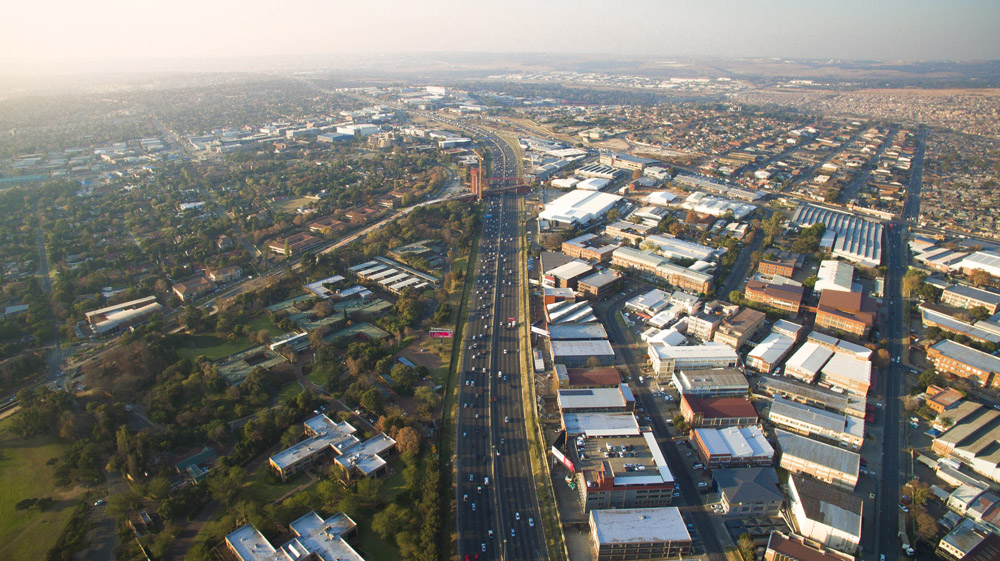
©Johnny Miller, Alex Sandton Bridge, Government programs are working to overcome the separation caused through infrastructure which kept people separate during the apartheid regime. This bridge is being built to provide a walkway for people in Alexandra who work in the rich suburb of Sandton to get to work. Johannesburg, South Africa.
Johnny Miller (b.1981) is the Founder and creative force behind AfricanDrone and Unequal Scenes. He is based in Cape Town, South Africa, and has extensive networks and knowledge of contemporary African and world issues. His focus is on the urban, cultural, and social issues facing humanity in a fast-changing world.
He has received worldwide acclaim for his project “Unequal Scenes”, an aerial exploration of inequality in South Africa.
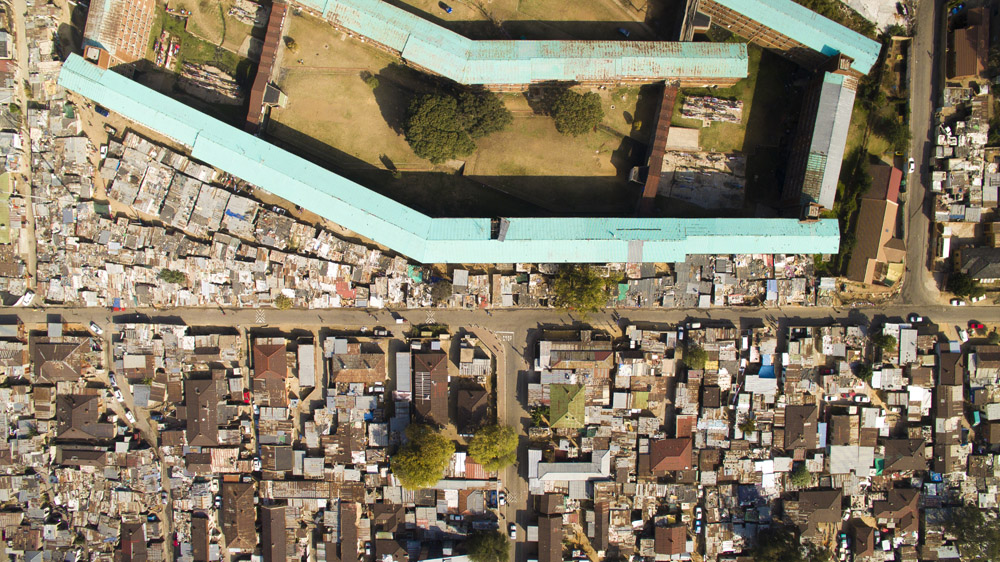
©Johnny Miller, Alex Sandton, The women’s hostel is one of the oldest and most recognizable housing developments in the poor township of Alexandra. Johannesburg, South Africa.
Unequal Scenes
Inequalities in our social fabric are oftentimes hidden, and hard to see from ground level. Visual barriers, including the structures themselves, prevent us from seeing the incredible contrasts that exist side by side in our cities.
The beauty of being able to fly is to see things from a new perspective – to see things as they really are. Looking straight down from a height of several hundred meters, incredible scenes of inequality emerge. Some communities have been expressly designed with separation in mind, and some have grown more or less organically. The locations in these photographs represent the frustrations, the setbacks, the fear, and the desires of the millions who live in similar situations.
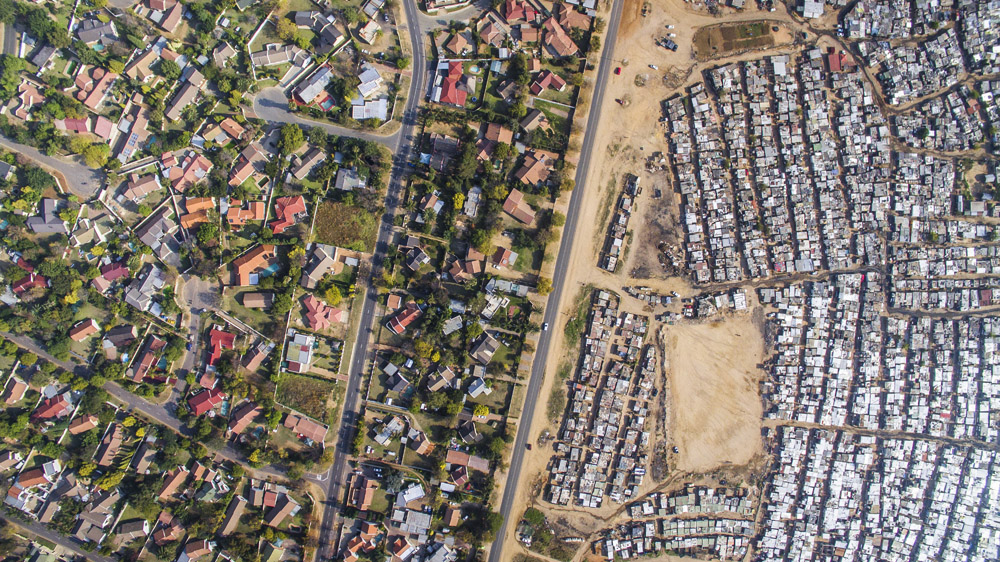
©Johnny Miller, Bloubosrand Kya Sands, The story of Kya Sands is the story of ash, smoke, and broken promises. This informal settlement has been subjected to numerous fires, xenophobic violence, and protests just in the last five years. The middle-class suburb on the left contains multi-million rand homes. Johannesburg, South Africa.
All the locations pictured here were researched using data and mapping software to find highly economically unequal locations, which were then photographed and recorded using a DJI Inspire drone. The final images were not photoshopped or modified in any way, except for basic cropping, exposure, and color corrections.
The images speak to the issues of inequality in our society in an unambiguous, objective way. By providing a new perspective on an old problem, I hope to provoke a dialogue which can begin to address the issues of inequality and disenfranchisement in a constructive and peaceful way.
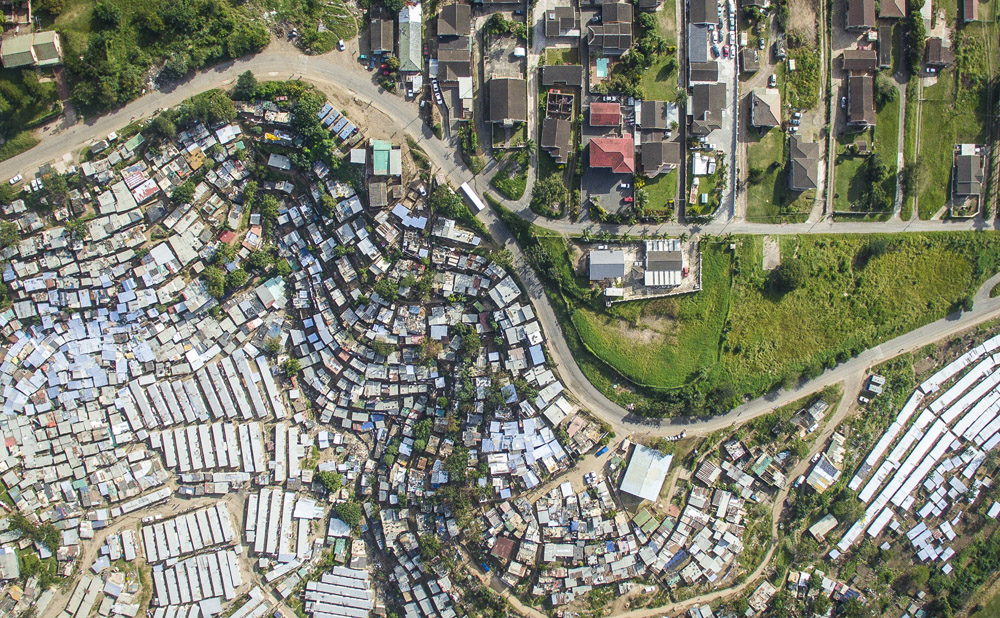
©Johnny Miller, Durban – Kennedy Rd, Kennedy Road one of several informal settlements located in the vicinity of the N3 highway and the Umgeni River, in Durban. A quick glance at a map reveals perhaps upwards of 10 within a few kilometers of each other, winding along the ancient riverbanks like metal serpents. Looming directly behind the settlement is the Bisasar Landfill, Africa’s largest. Hosting 19 million cubic metres of waste, the dump was described by Carl Albrecht, research director of the Cancer Association of South Africa, as a toxic ‘cancer hotspot’ where residents “are like animals involved in a biological experiment.” Durban, South Africa.
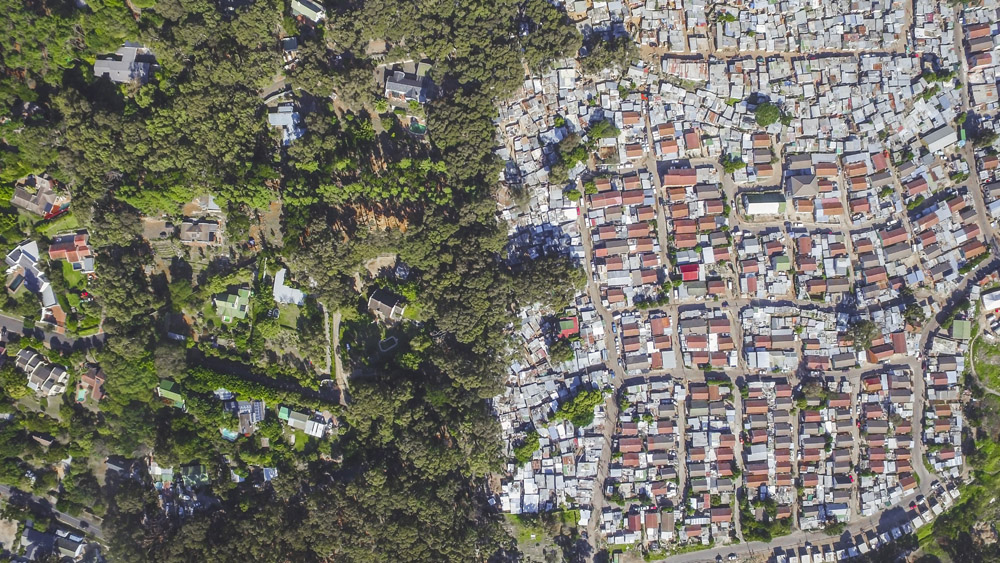
©Johnny Miller, Hout Bay Imizamo Yethu, Hout Bay is a picturesque valley about 15km south of Cape Town, situated between several mountains. There is a protected harbor at one end of the valley, which is one of the busiest fishing harbors in the Western Cape, along with several wealthy housing estates, hotels, and small farms. Nestled between two of these affluent housing estates is the suburb of Imizamo Yethu. Imizamo Yethu (IY) is comprised of both a designated housing area and an “informal settlement” area, which is largely comprised of small shack dwellings which stretch up the steep slopes of the mountain behind it. The shacks in this informal settlement reach right to the very edge of the demarcated area, in a densely packed jumble of tin roofs. In fact, even though the total area of IY is much smaller than the whole Hout Bay valley, the two have roughly the same population, 15538 vs. 17329. (City of Cape Town Census 2011) Cape Town, South Africa
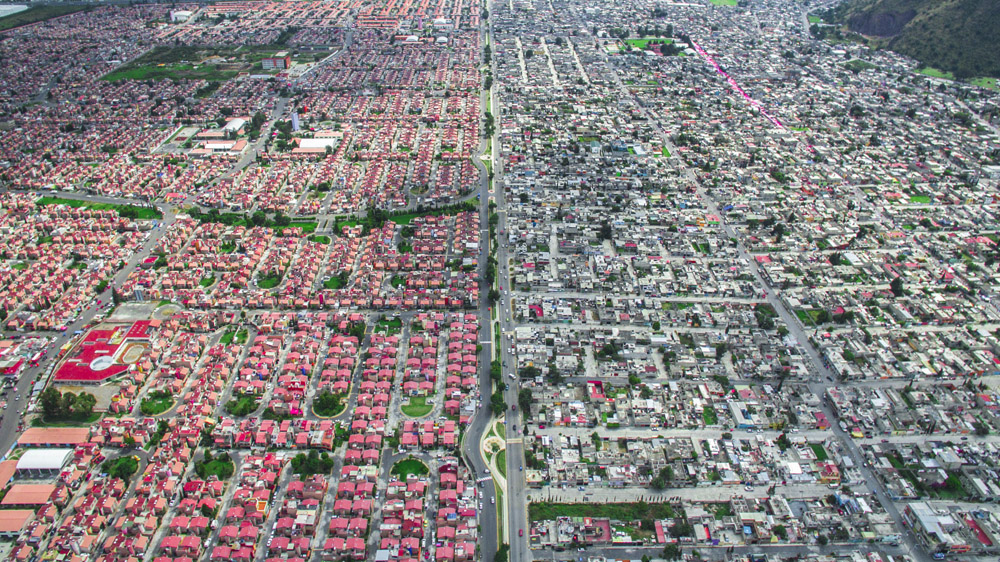
©Johnny Miller, Ixtapalapa, Housing estates are on a massive scale in Mexico, sometimes side by side with impoverished communities. Ixtapalapa, Mexico.
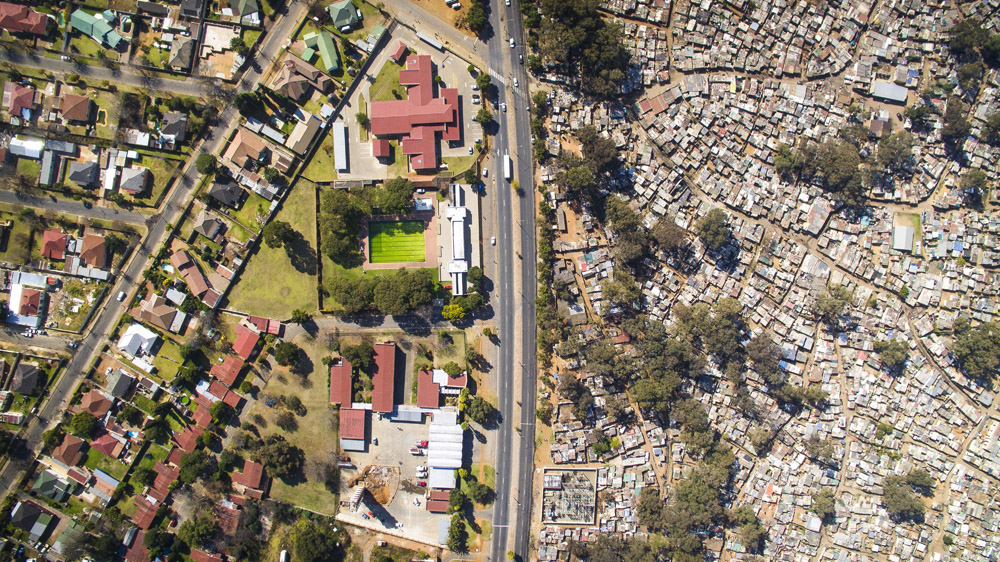
©Johnny Miller, Joburg – Primrose, A township, formerly housing workers for an adjacent gold mine, sits opposite a middle-class neighborhood. Johannesburg, South Africa.
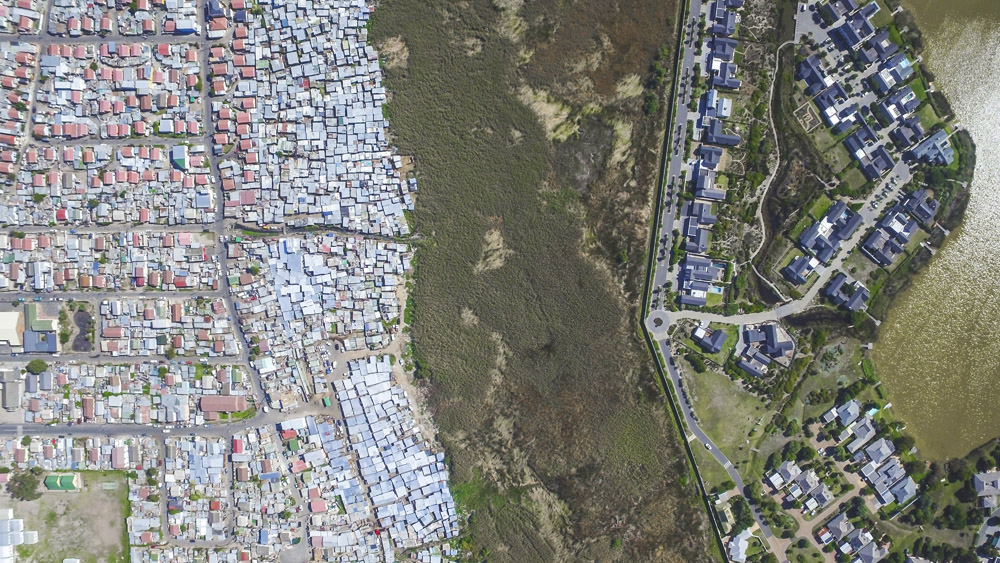
©Johnny Miller, Masiphumelele Lake Michelle, The Southern Cape Peninsula, about 20km from Cape Town’s city center, is comprised of several idyllic, picturesque suburbs such as Noordhoek, Kommetjie, and Fish Hoek. Horse riding tours are common on nearby Long Beach. Surfing is a popular pastime. Sandwiched within the “Sun Valley” communities is Masiphumelele. There are approximately 38000 people living there, many in small tin shacks. There is no police station, only one small day clinic, and it’s estimated that up to 35% of the population is infected with HIV or TB (Wikipedia + Masicorp). Fires are common in winter, which sweep through the shacks, sometimes displacing residents by the hundreds. Moreover, the entire community of 38000 is accessed by only one single exit/entrance. Cape Town, South Africa.
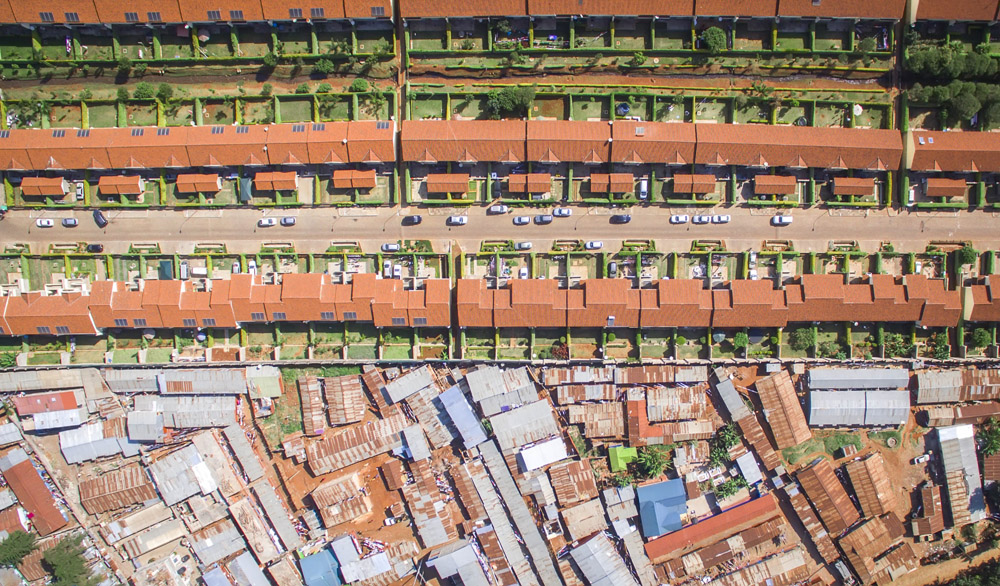
©Johnny Miller, Nairobi, Loresho is an upscale suburb of Nairobi, bordering a poor slum. Nairobi is a complicated city, with a patchwork of development making it difficult to provide equity throughout a huge population struggling to survive. Nairobi, Kenya.
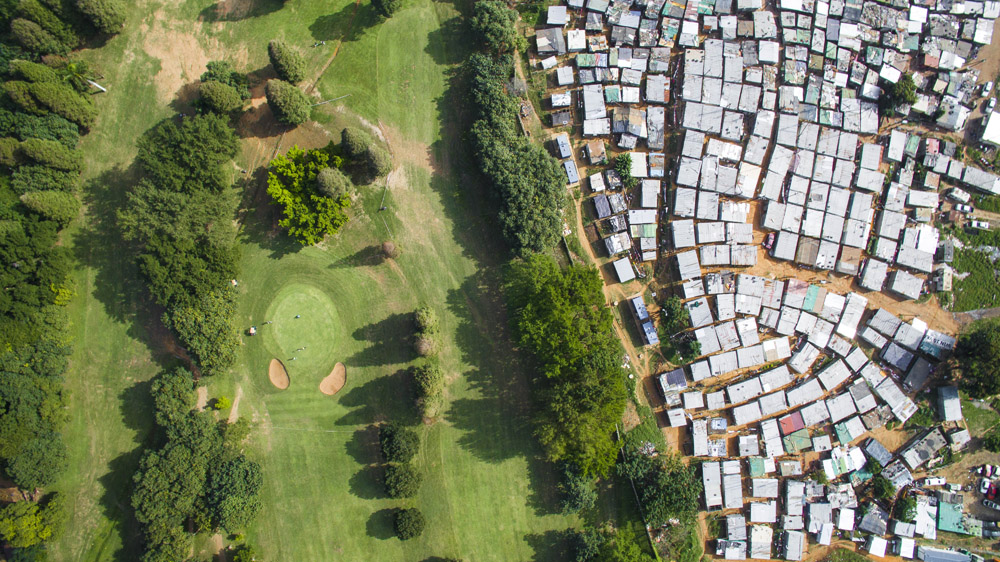
©Johnny Miller, Papwa Sewgolum Golf Course Papwa Sewgolum Golf Course is located along the lush green slopes of the Umgeni River in Durban. Almost unbelievably, a sprawling informal settlement exists just meters from the tee for the 6 hole. A low-slung concrete fence separates the tin shacks from the carefully manicured fairways. In a twist of irony, the golf course is named after an apartheid-era golfer of Indian descent, named Sewsunker “Papwa” Sewgolum. Durban, South Africa
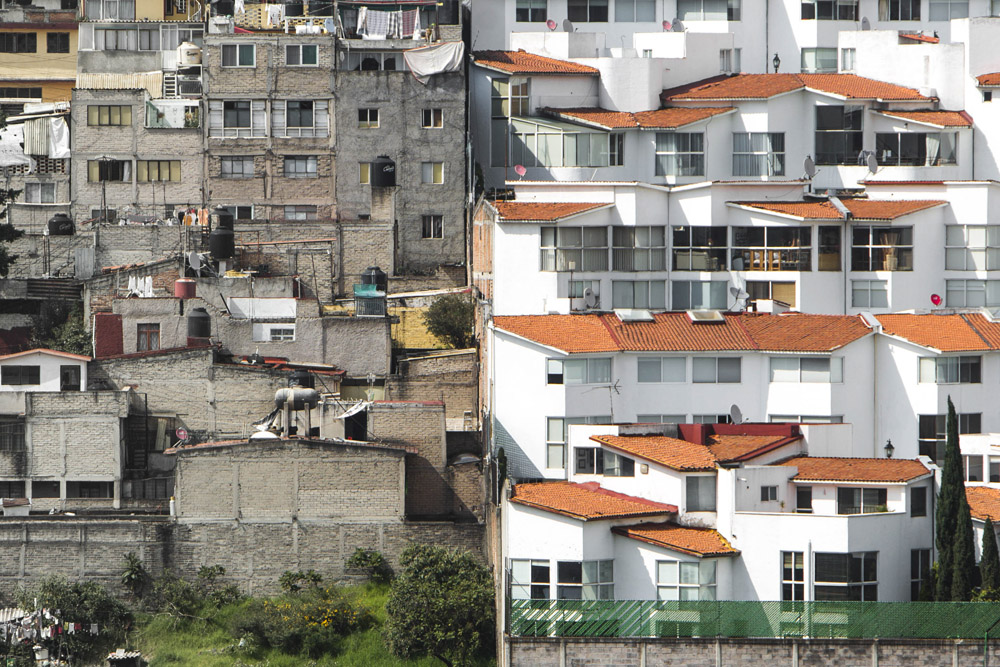
©Johnny Miller, Santa Fe, Mexico is one of the most unequal cities in the world, with only 4 multimillionaires accounting for 9% of GDP. Many of these millionaires live in Santa Fe, an upscale suburb which happens to encompass several huge slums as well. Santa Fe, Mexico.
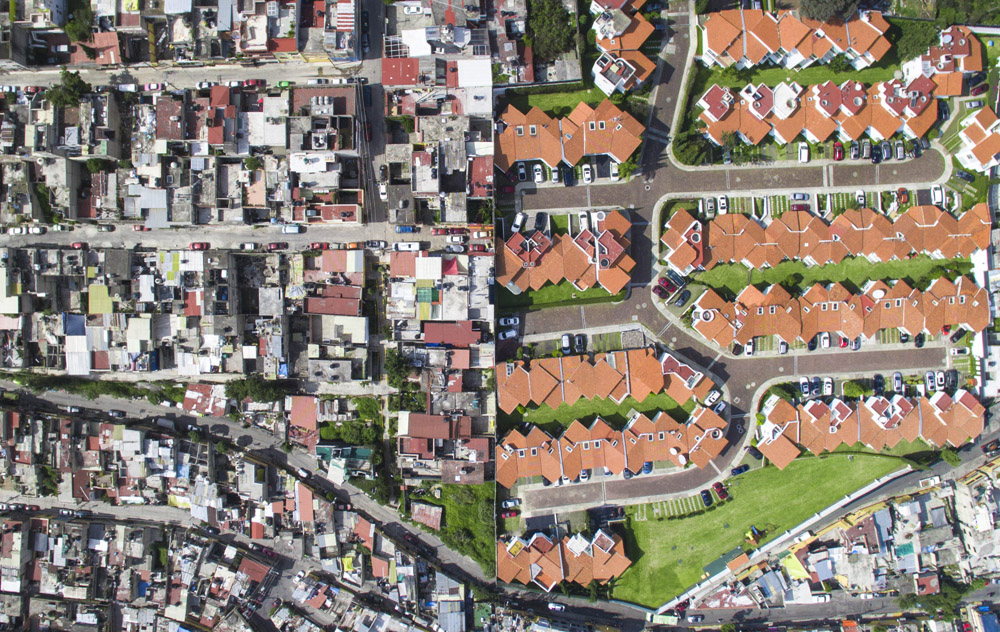
©Johnny Miller, Santa Fe1, Santa Fe is an area of mountainous terrain on the outskirts of Mexico City’s choked urban center. It was built as an escape for the wealthy and elite, far from the smog and traffic. As the city has grown however, Santa Fe is now a distinct urban center in its own right, with high-rise buildings, traffic, and crime all its own. As land is at a premium, developers have taken to carving out sections of the violent slum to create upmarket, wealthy gated neighborhoods which exist literally next to extreme poverty. Santa Fe, Mexico.
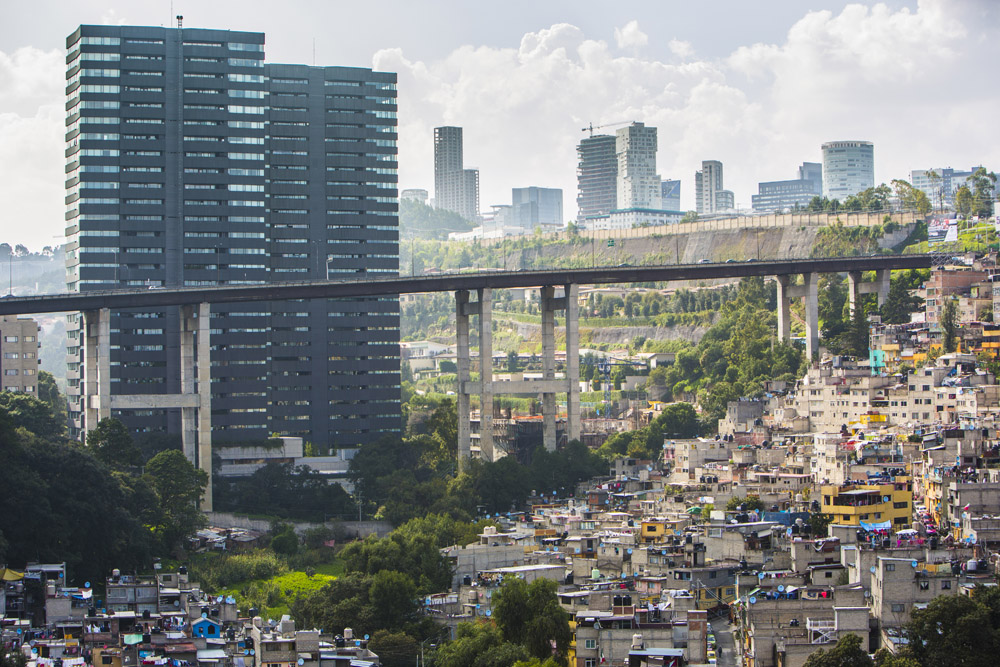
©Johnny Miller, Santa Fe2, Santa Fe is an area of mountainous terrain on the outskirts of Mexico City’s choked urban center. It was built as an escape for the wealthy and elite, far from the smog and traffic. As the city has grown however, Santa Fe is now a distinct urban center in its own right, with high-rise buildings, traffic, and crime all its own. The highway which spans this ravine separates some of Santa Fe’s wealthiest residents from those of the slum on the other side. The slum area, notorious in the area for its size and violence, also serves as a source of labor for the myriad building projects ongoing in Mexico City. Santa Fe, Mexico.
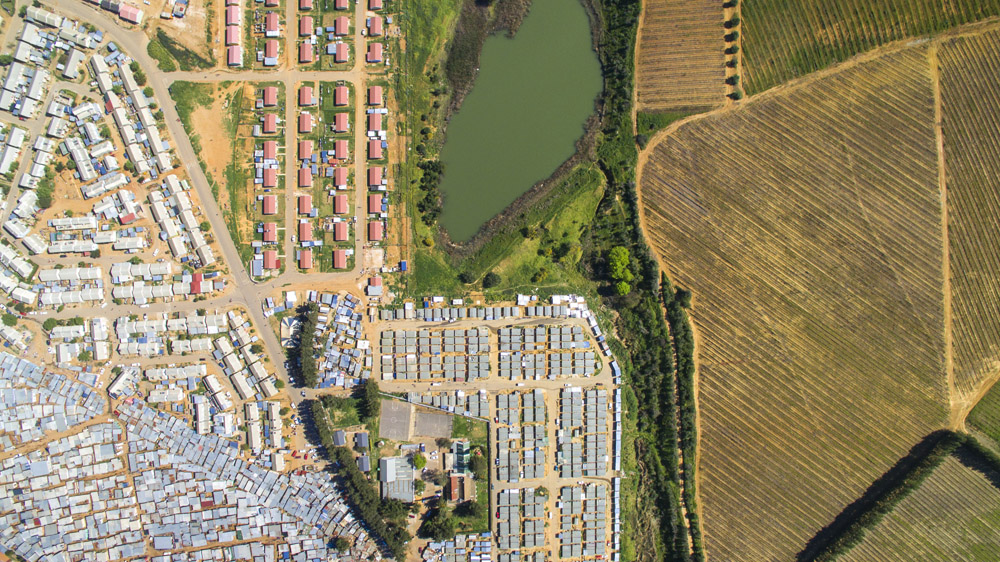
©Johnny Miller, Stellenbosch, Stellenbosch is the center of the winelands in South Africa, a fertile and extremely beautiful region just northeast of Cape Town. Kayamundi is a desperately poor township just beside Stellenbosch. It sprawls up and over a small mountain just outside of town, occasionally devastated by the ubiquitous shack fires that plague South African townships. A major shack fire in 2013 displaced over 2500 people. Stellenbosch, South Africa
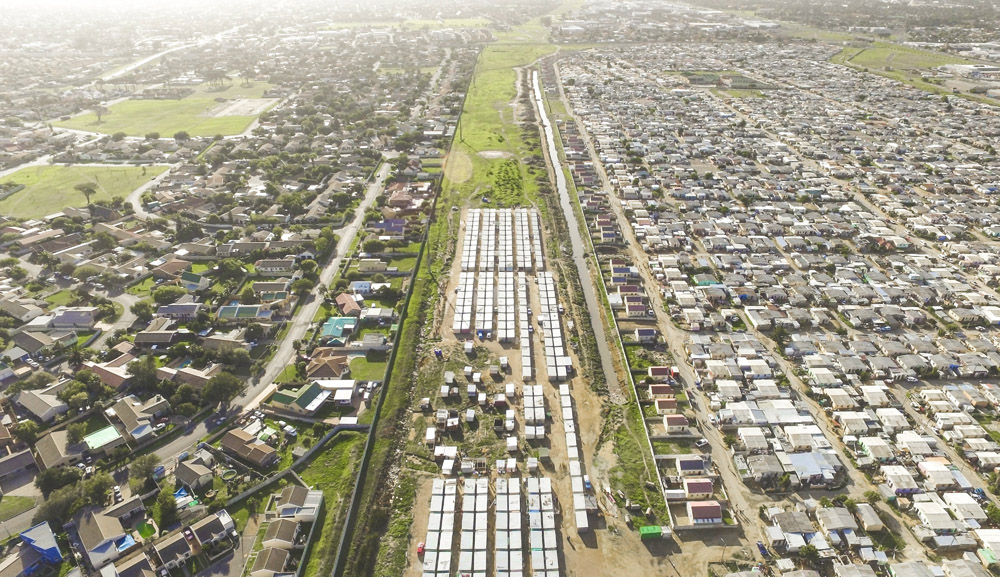
©Johnny Miller, Strand Nomzamo, There is a clear land buffer (supplemented with fencing) separating the wealthier housing of Strand from Nomzamo/Lwandle. It seems to me that existing in this “middle space” reinforces the notion of living on the fringe, alienated and/or marginalized. With the help of an aerial view it becomes easier to understand how extremely difficult it must be to remove one’s self from this type of situation. Strand, South Africa.
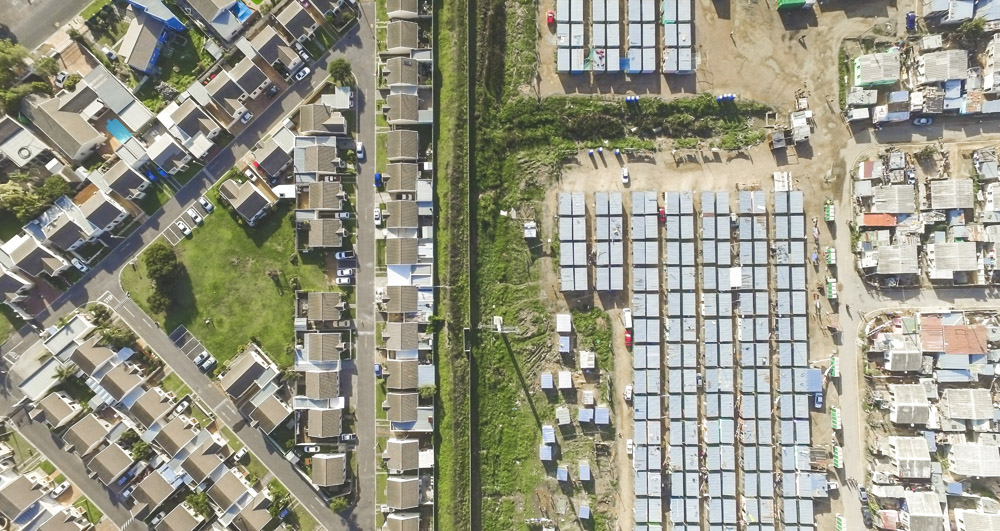
©Johnny Miller, Strand Nomzamo, Geometric patterns are apparent in the city-built shacks, in the “no-man’s land” between the former “European” area of Strand and the “African” area of Nomzamo. Strand, South Africa
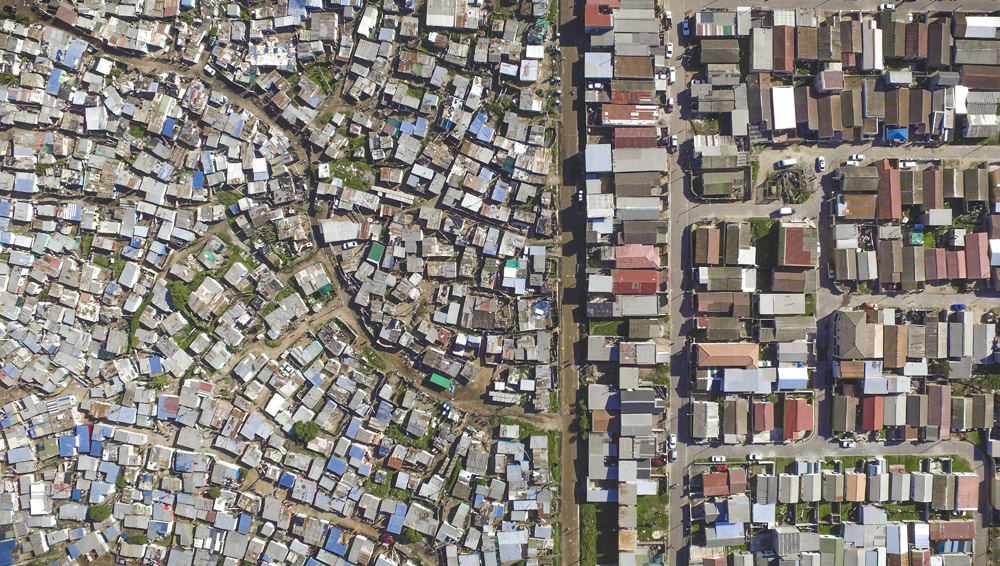
©Johnny Miller, Vukuzenzele Sweet Home, Sweet Home was primarily a dumping ground for builder’s rubble like bricks, which you can still see being recycled on the side of the road today near the south end of the settlement. Services and conditions are poor. Vukuzenzele, just to the north, was developed in collaboration with a fund to provide affordable housing to South Africans. The visual difference between the two is stark. The organic network of roads and dwellings to the south contrasts sharply with the orderly, geometric patterns of the planned community to the north. This means much more than simply representing a difference in wealth, writes Diana Mitlin. “Just as the community capacity building element provides an essential legacy in being a social asset that will help enable the community to address its future goals, so the development of physical assets provides essential assistance. In this case, the physical assets incorporate secure tenure, access to adequate services and improved living conditions. This enables families to have access to healthy living conditions and offers them the opportunity to accumulate resources. However, the development of physical assets is also important for another reason; it provides the arena within which collective skills and capacities can develop.” Cape Town, South Africa
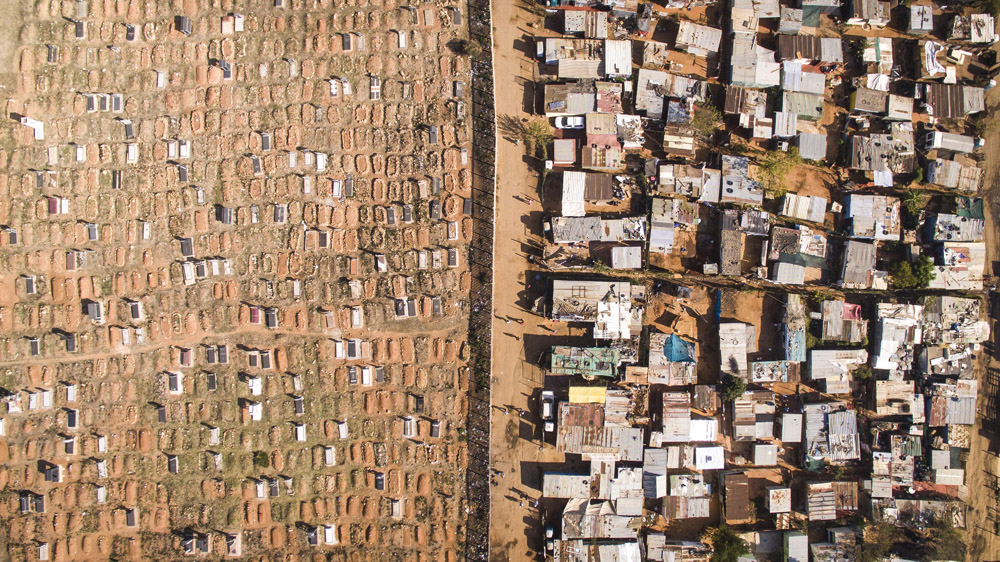
©Johnny Miller, Vusimuzi Mooifontein Cemetery, On the day I was there, a wind whistled through the power lines and the faint drone of a jet, high above, were all that was audible. The graves and the shacks, side by side, were extremely eerie to me. I imagined that the ghosts of one haunt the ghosts of the other. Johannesburg, South Africa
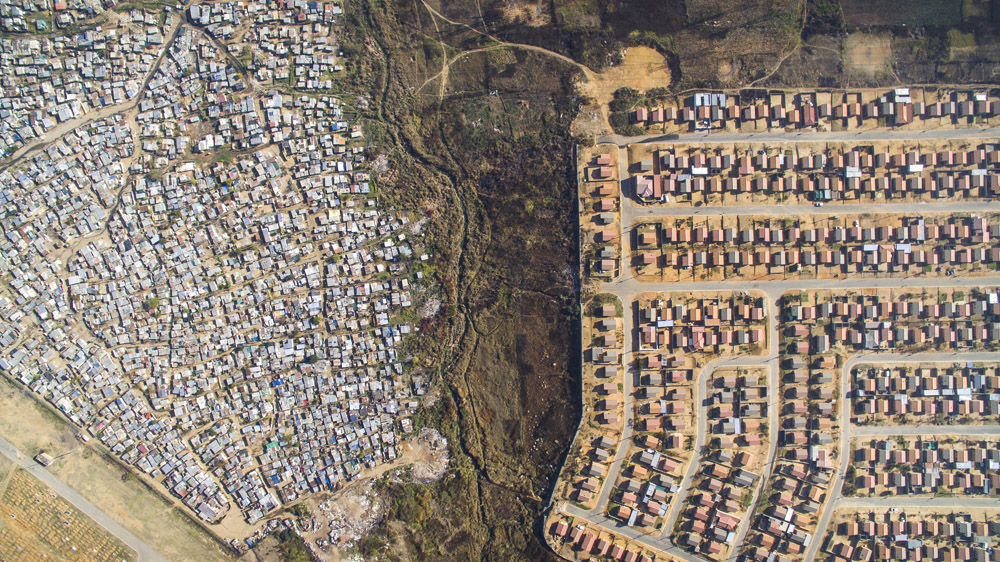
©Johnny Miller, Vusimuzi Mooifontein Cemetery, Between Ehlanzeni and Vusimuzi, there are over 30000 people living in approximately 8500 shacks, on the margins of the former township of Tembisa, Gauteng. Service delivery, including sanitation, electricity, policing, and education, is extremely poor. Contrasted to the greater province of Gauteng, Vusimuzi is an anomaly. Gauteng is the richest province in South Africa, and Johannesburg is the richest city. Gauteng contributes almost 1/3 of South Africa’s total GDP, and is rapidly modernizing into a world-class city. Johannesburg, South Africa
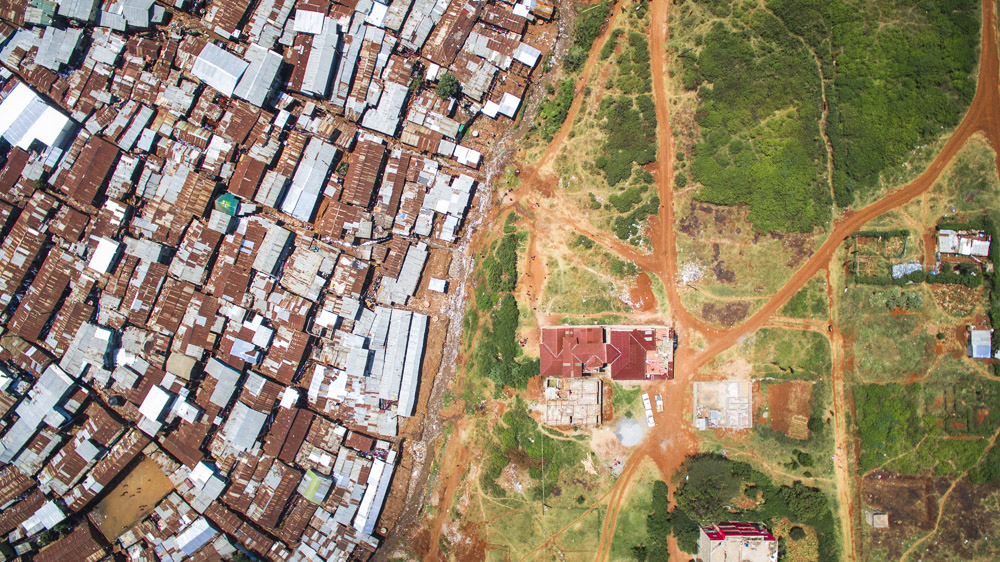
©Johnny Miller, Nairobi, Kibera slum is a huge slum which is estimated to hold up to a million inhabitants. Kibera is desperately poor, with open sewage running through the streets, rubbish everywhere, and a very dangerous train line which bisects the slum. Surrounding houses seem empty by comparison. Nairobi, Kenya.
Posts on Lenscratch may not be reproduced without the permission of the Lenscratch staff and the photographer.
Recommended
-
Shane Hallinan: The 2025 Salon Jane Award WinnerFebruary 12th, 2026
-
Greg Constantine: 7 Doors: An American GulagJanuary 17th, 2026
-
Yorgos Efthymiadis: The James and Audrey Foster Prize 2025 WinnerJanuary 2nd, 2026
-
Arnold Newman Prize: C. Rose Smith: Scenes of Self: Redressing PatriarchyNovember 24th, 2025
-
Celebrating 20 Years of Critical Mass: Cathy Cone (2023) and Takeisha Jefferson (2024)October 1st, 2025

